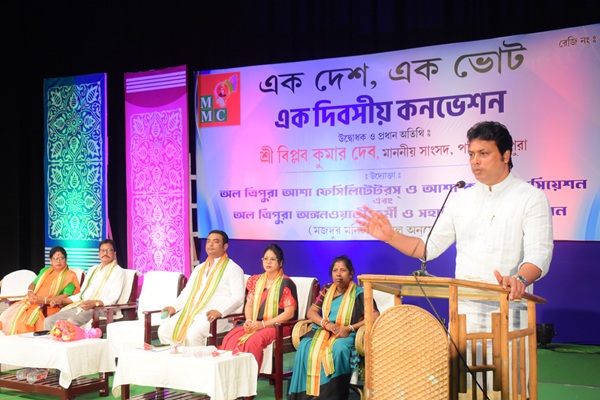"One Nation, One Election,": Congress party imposed the Emergency in India from 1975 to 1977 for the benefit of a single family, Biplab claimed

Agartala, Apr 07, 2025, By Our Correspondent
Agartala: April 07: During a convention titled "One Nation, One Election," held at Rabindra Centenary Bhavan, MP Biplab Kumar Deb made strong remarks about Congress and its historical actions. He claimed that the Congress party imposed the Emergency in India from 1975 to 1977 for the benefit of a single family. Deb also alleged that Congress's first Prime Minister, Jawaharlal Nehru, had attempted to destabilize state governments through unethical means, using provisions to further their own political interests.
Deb expanded his criticism to include the Communists, accusing them of similarly undermining democratic processes. He pointed out that Jyoti Basu, the former Chief Minister of West Bengal, had played a role in toppling governments in three states by withdrawing support from PV Narasimha Rao's minority government. According to Deb, both Congress and the Communists oppose the idea of simultaneous elections because it would prevent them from distracting voters with various misleading tactics. He emphasized that during the 1975 Emergency, those who protested were imprisoned for nearly two and a half years.
Deb further criticized Congress for manipulating election policies to conduct elections at different times, which, according to him, caused financial losses and wasted valuable time. He argued that simultaneous elections would save both time and money, allowing governments to focus on public welfare rather than being constantly preoccupied with election cycles. The savings could then be used for the benefit of underprivileged sections of society. Deb credited Prime Minister Modi for championing the idea of "One Nation, One Election," seeing it as a move towards efficiency and national progress.
In both events, Deb strongly condemned Congress and the Communists for their politically motivated actions, which he believed harmed the nation's interests.